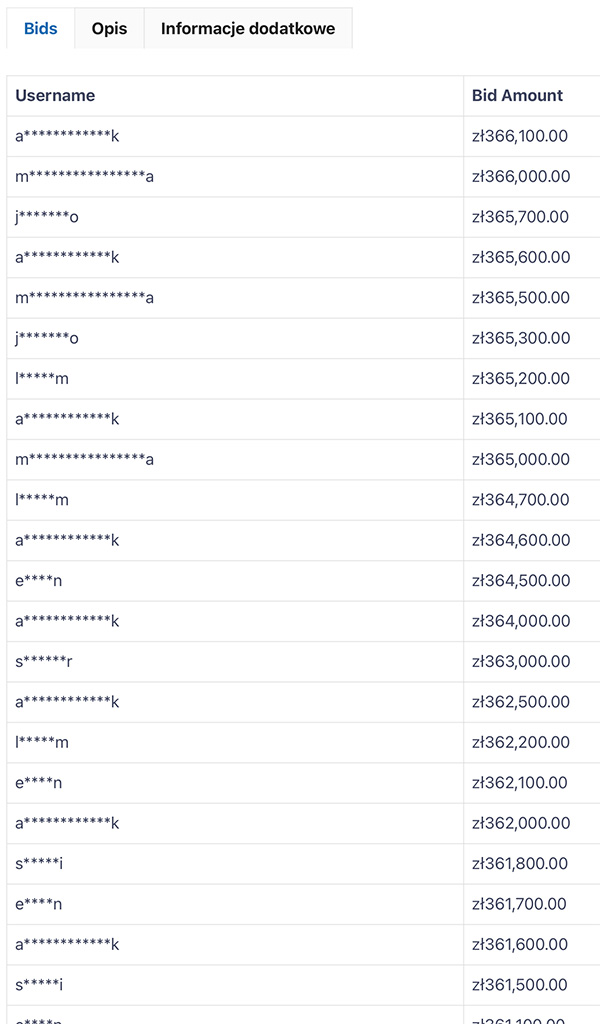When we wanted to sell our apartment, we mistakenly priced ourselves too low. It seemed like a natural fit to offer the house via an online auction, but would the Polish market be ready for home auctions?


Poland & Auctions
Online auctions are offered in Poland, but not for homes. The two biggest players are Allegro.pl and eBay.pl. Both of these have a commanding presence, but why don’t they allow home auctions?
Also, government auctions exist for repossessed homes. These auctions are conducted in-person, in each district. In order to bid in these auctions, prospective buyers must deposit a substantial amount of money (ie. $30k) in order to be able to bid and the full amount is due at the end of the auction. These auctions often have low turnouts due to lack of interest, inability to pay cash upfront, and the varied locations of each auction.
Is Poland ready for online Home auctions?
In 10 days, we needed to
1. Design the website layout
2. Create website content
3. Translate website content
4. Test prebuilt wordpress auction plugins
5. Stage all content to development servers
6. Move content to production
7. Final multiple user tests in production
PLUS we showed the apartment to 30+ people and completed paperwork to prepare for the sale.
Business = Problems
Bidder Confidence
- We started the auction far below the market price we could have easily received. We wanted to show that a deal could be possible and hoped this would encourage participation.
- A strong emphasis was placed on legal terms and conditions for site use. We wanted users to know what was expected of them and what they could expect from us. This was new territory for all of us and it was important to be honest about the challenges.
- Individual support was given to users who were not comfortable setting up an account with Aucja.com.
Auction Plugins
- We had neither the time nor the resources to develop our own wordpress auction plugin, so we selected the top 5 paid plugins and tested them based on: speed, features, ease of use, ability to offer multiple languages, and support.
- Two auction plugins seemed capable of meeting our needs. The day before our first real auction, we moved the site into production and ran multiple concurrent user tests on the live server with constant refreshes.
- A flaw was revealed in the plugin selected (translations didn’t work for some key elements) and we had less than 24 hours to change the plugin, retranslate all auction options into Polish, move the database of previous live bids, and retest for multiple users.
- The second plugin’s update speed was too slow with multiple users, so I contacted our hosting provider to massively upgrade our services. Finally, we were working with about 30 minutes to spare before the real auction began.
The Auction
- 10+ people signed up for the website out of the 30+ that had viewed the apartment directly. Of that 30+, 20 had made offers without wanting to be involved in an auction.
- There were 10 unique bidders for the apartment
- Starting bid was 310,000 PLN, final bid was 366,100 PLN
Technology Used
- WordPress with WooCommerce
- GeneratePress for the framework and theme
- WPML and Poedit for the translation work
- Local lightning and WPVivid for the development server and transfer to production
- YITH Auction plugin
- Fluent forms for the contact page
- Figma & Photoshop
- plus a few other small ones


Analysis of Results
Poland isn’t ready for online home auctions
- 10 people refused to participate after giving in-person offers.
- Bidders often wanted to bid only the minimum amount needed to place another bid. We went up 100 PLN 8 times.
- Several people contacted us after the auction ended and offered to pay an additional 1000 PLN over the winning bid price. Clearly people were not comfortable participating or were trying to keep the price low.
How to Improve
An Auctioneer
- In a traditional in-person auction, an auctioneer reads the crowd and sets the next bid amount. Initially, bids increase in large increments. As the auction nears the final price, the bid increase is much smaller. We needed an auctioneer system to read the crowd and quickly push us past the lower amounts. This would have solved the issue with the multiple 100 PLN increases early on.
Time
- Acceptance of a home buying auction needs time to build up history and a level of trust to show that the process works. It’s much easier to build this trust with auctions of small goods, where the possible loss for the seller is small. Few people may be interested in taking a chance on an asset as large as a home.
Aucja Isn’t a Good Startup Idea
- Significant resources are required to develop an in-house auction plugin that scales to handle multiple simultaneous auctions.
- An AI Auctioneer would need to be created in order to maximize the value of an auction and keep the bids flowing.
- Both Allegro and eBay already have the technology and the trust in order to compete in this space once they decide to allow this type of auction.
What could work
Polish government foreclosure auctions would greatly benefit by moving online. There would be more participants and transparency with the auctions.

